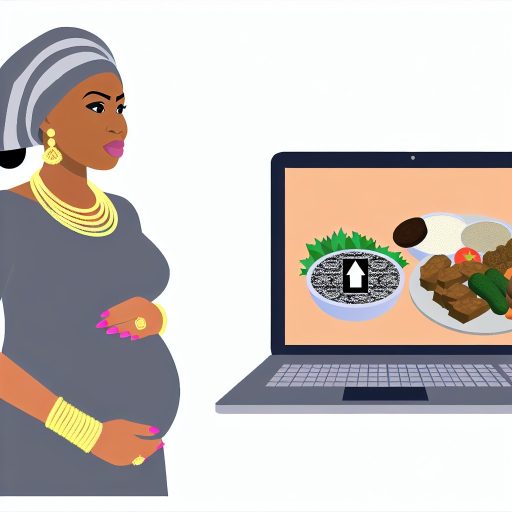Introduction
Pregnancy is a crucial period in a woman's life.
Proper nutrition is essential for the health of both the mother and the developing baby.
One key nutrient that is particularly important during pregnancy is calcium.
In Nigeria, pregnant women have specific dietary needs that must be met to ensure a healthy pregnancy and childbirth.
Calcium plays a vital role in supporting the growth and development of bones and teeth in both the mother and the baby.
The benefits of calcium during pregnancy extend beyond skeletal health.
It also helps in muscle function, nerve transmission, and hormone production.
Adequate calcium intake can prevent conditions like preeclampsia and low birth weight.
Fortunately, there are various sources of calcium that are readily available in Nigeria.
Dairy products such as milk, yogurt, and cheese are rich in calcium and are commonly consumed by pregnant women.
Leafy green vegetables like ugwu and okazi also provide calcium along with other essential nutrients.
Other sources of calcium include seafood like crayfish and shrimp, as well as beans and nuts.
For women who may have dietary restrictions or allergies, calcium supplements can be recommended by healthcare providers to ensure adequate intake.
Calcium is essential for the development of the baby's bones and teeth.
It helps prevent osteoporosis in the mother.
Unlock the Power of Nigerian Food Minerals
Discover personalized Food Advisory tailored to boost your health or business using expert insights on Nigerian minerals.
Get StartedCalcium plays a role in muscle function and nerve transmission.
It also reduces the risk of gestational hypertension and preeclampsia.
Importance of Calcium for Pregnant Women
During pregnancy, the demand for calcium increases as the baby's bones and teeth begin to form.
Calcium is crucial for the proper development of the skeletal system in the growing fetus.
It is also needed for the mother's bone health, as pregnancy and breastfeeding can deplete maternal calcium stores.
Getting an adequate amount of calcium can help prevent bone-related issues in both the mother and the baby.
Sources of Calcium for Pregnant Women in Nigeria
- Dairy products such as milk, yogurt, and cheese are excellent sources of calcium.
- Green leafy vegetables like ugwu, okra, and spinach are also good sources of calcium.
- Fish, especially small fish with soft bones like sardines, are rich in calcium.
- Nuts and seeds such as almonds, sesame seeds, and chia seeds contain calcium.
- Legumes like beans, lentils, and chickpeas are plant-based sources of calcium.
- Fortified foods like fortified orange juice, soy milk, and cereals can help meet calcium needs.
- Traditional Nigerian foods like ogbono soup, egusi soup, and vegetable soups can provide calcium.
Tips for Increasing Calcium Intake
- Include a variety of calcium-rich foods in your diet to ensure adequate intake.
- Try to include dairy products in your meals like milkshakes, yogurt parfaits, and cheese snacks.
- Use fortified foods like cereals and soy milk as a convenient way to boost calcium levels.
- Snack on nuts and seeds for a quick and healthy calcium boost during the day.
- Cook traditional Nigerian dishes with plenty of green leafy vegetables for added calcium content.
- Consider taking calcium supplements if you are unable to meet your daily requirements through diet alone.
- Consult with a healthcare provider or a nutritionist for personalized advice on calcium intake during pregnancy.
Benefits of Adequate Calcium Intake During Pregnancy
Calcium is vital for pregnant women in Nigeria to support the growth and development of their babies.
By incorporating a variety of calcium-rich foods into their diets, pregnant women can ensure they meet their daily requirements.
Consulting with a healthcare provider for guidance on calcium intake can help pregnant women make informed choices for a healthy pregnancy.
When it comes to calcium sources for pregnant women in Nigeria, dairy products play a crucial role in meeting their nutritional needs.
Dairy Products
Nigeria is home to a variety of dairy products such as milk, yogurt, and cheese.
These products are readily available in both urban and rural areas.
This availability makes it easier for pregnant women to access them.
Calcium Content: Dairy products are known for their high calcium content.
Captivate Your Audience with Exclusive Nigerian Food Content
Imagine your platform enriched with unique, mineral-rich Nigerian cuisine stories that no one else can offer. Let's create content that resonates deeply and sets you apart.
Get StartedCalcium is essential for the development of the baby’s bones and teeth.
Milk, yogurt, and cheese are rich sources of calcium.
They provide pregnant women with the necessary nutrients to support their own health and the growth of the fetus.
Tips for Including Dairy Products in Daily Diet:
- Start the day with a bowl of yogurt topped with fruits for a calcium-rich breakfast option.
- Include a glass of milk as a mid-morning or afternoon snack to boost calcium intake.
- Use cheese as a topping for salads, sandwiches, or pasta dishes to increase calcium consumption.
- Incorporate traditional Nigerian dairy products like “wara” (local cheese) or “nono” (fermented milk) into meals for an added calcium boost.
By including dairy products in their daily diet, pregnant women can ensure they meet their calcium needs.
This helps support a healthy pregnancy and the proper development of the baby’s bones and teeth.
Discover More: Vitamins and Minerals for Nigerian Pregnancies
Leafy Green Vegetables
Leafy green vegetables are essential sources of calcium for pregnant women in Nigeria.
Here are some popular Nigerian leafy green vegetables.
- Ugu
- Ewedu
- Spinach
Rich in Calcium
These vegetables are rich in calcium.
Calcium is crucial for the development of the baby's bones and teeth.
Calcium also helps in muscle function and nerve signaling.
Recipes and Cooking Methods
To retain the calcium content in these vegetables, it is important to cook them properly.
Here are some recipes and cooking methods.
- Ugu: Prepare a delicious ugu soup by sautéing onions, garlic, and tomatoes. Add chopped ugu leaves and simmer until tender. Serve with fufu or rice.
- Ewedu: Boil ewedu leaves until soft, then blend until smooth. Serve with a traditional Nigerian soup like egusi or ogbono.
- Spinach: Sauté spinach with garlic and chili flakes for a quick and nutritious side dish. Add to omelets or salads for an extra nutrient boost.
Significance of Including Variety in Diet
It is essential to include a variety of vegetables in the diet to ensure a well-rounded intake of nutrients.
Different vegetables offer unique benefits.
Diversifying your choices is key.
By incorporating leafy green vegetables like ugu, ewedu, and spinach into your diet, you can enhance your calcium intake and support a healthy pregnancy.
Make sure to explore different recipes and cooking methods to enjoy these nutrient-packed vegetables to the fullest.
You Might Also Like: Top Nigerian Foods for Child Growth and Development
Nuts and Seeds
Almonds are rich sources of calcium.
Sesame seeds are rich sources of calcium.
Including nuts and seeds in the diet boosts calcium intake.
Snack options include almond butter with apple slices.
Sesame seed crackers also make good snacks.
Meal ideas include sprinkling sesame seeds on salads.
You can add almonds to oatmeal for added nutrition.
Traditional Nigerian nuts like groundnuts are good sources of calcium.
- Almonds and sesame seeds are rich sources of calcium.
- Including nuts and seeds in the diet boosts calcium intake.
- Snack options: almond butter with apple slices, sesame seed crackers.
- Meal ideas: sprinkle sesame seeds on salads, add almonds to oatmeal.
- Traditional Nigerian nuts like groundnuts are also good sources of calcium.
Learn More: Child Nutrition: Nigerian Foods to Boost Health

Fish with Edible Bones
- Common types of fish in Nigeria with edible bones include sardines and herrings.
- Consuming fish with bones is beneficial for calcium intake for pregnant women.
- Recipes like fish stews or grills can incorporate these fish into pregnant women’s diets.
- Mercury levels in fish consumption during pregnancy can be a concern, but small fish like sardines are generally low in mercury.
Adding fish with edible bones to the diet of pregnant women in Nigeria can be a great way to enhance their calcium intake.
Common types of fish found in Nigeria that have edible bones include sardines and herrings.
Not only are these fish readily available and affordable, but they also offer a host of health benefits for both the mother and the developing baby.
One of the key advantages of consuming fish with bones is the high calcium content they provide.
Calcium is essential for the development of the baby’s bones, teeth, and muscles.
It also plays a crucial role in preventing conditions like pre-eclampsia and ensuring the overall health of the mother during pregnancy.
There are numerous delicious ways to incorporate fish with edible bones into a pregnant woman’s diet.
Recipes such as fish stews, grilled fish, or fish curry are popular choices in Nigerian cuisine.
These dishes not only add variety to the diet but also ensure a good intake of calcium and other essential nutrients.
While fish is a great source of nutrients, it is important to be mindful of mercury levels, especially during pregnancy.
Large fish such as tuna or shark tend to have higher mercury levels, which can be harmful to the developing baby.
However, smaller fish like sardines are generally low in mercury and safe for consumption in moderation.
Incorporating fish with edible bones into the diet of pregnant women in Nigeria can be a nutritious and tasty way to boost their calcium intake.
By choosing smaller fish like sardines and herrings, pregnant women can enjoy the benefits of fish consumption without worrying about mercury levels.
It is essential to consult with a healthcare provider or nutritionist to ensure a well-balanced diet during pregnancy.
Explore Further: Meeting Kids’ Nutritional Needs with Nigerian Diet
Legumes and Pulses
List of Legumes and Pulses in Nigeria
- Beans
- Lentils
- Groundnuts
Calcium Content in Legumes and Pulses
Legumes and pulses are rich in calcium.
Beans contain approximately 100 mg of calcium per cup.
Lentils provide 38 mg of calcium per cup.
Groundnuts have 50 mg of calcium per ounce.
Recipe Ideas for Incorporating Legumes and Pulses
- Bean Stew: Cook beans with tomatoes, onions, and spices for a nutritious meal.
- Lentil Soup: Boil lentils with vegetables and herbs for a warm and hearty soup.
- Groundnut Porridge: Blend groundnuts with water and maize flour for a delicious breakfast porridge.
Importance of Combining Plant-Based Calcium Sources with Vitamin D
Vitamin D is essential for the absorption of calcium in the body.
Combining legumes and pulses with vitamin D-rich foods improves calcium absorption.
Examples of vitamin D-rich foods include eggs and fish.
Sunlight exposure also enhances vitamin D levels for better bone health.
Importance of Calcium for Pregnant Women in Nigeria
Calcium plays a vital role in developing the baby's bones and teeth.
It also helps prevent conditions like preeclampsia and osteoporosis.
Pregnant women should include various calcium-rich foods in their diet.
Examples include dairy products, leafy green vegetables, nuts, and seeds.
This approach ensures meeting daily calcium requirements during pregnancy.
For detailed guidance, pregnant women in Nigeria can consult healthcare providers or nutritionists.
They may also refer to the Nigerian Dietary Guidelines for Pregnant Women.
Additionally, the World Health Organization website offers valuable information on healthy pregnancy diets.
Additional Resources
(PDF) Maternal nutrition among women from Sub-Saharan Africa …




